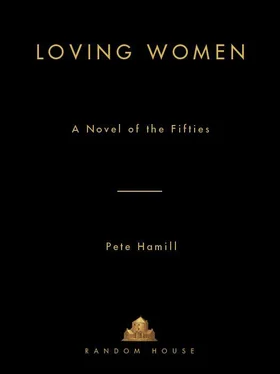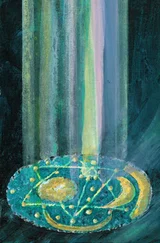The clock on the Blount Building said it was ten after six. And I thought: I’ll wait five more minutes. If she’s not here in five minutes, then she’s not coming . Maybe the whole thing was stupid. She was telling me something. I should take the hint. Just get out of here. Hell, I’m freshly shaved and smell good and have money in my pocket. I don’t have to wait here like a goddamned fool.
A car horn honked. Once. Then again.
I looked across the street at the sound. Eden Santana was behind the wheel of an old dark-green car, smiling at me and waving. I felt like doing cartwheels, shouting, punching street signs. I went around to the passenger side and she leaned across and opened the door.
“Get in,” she said. “You want to drive?”
“No, no,” I said. Closing the door, trying not to slam it, to show I was anxious. “You drive.”
She started driving again, making a left into a side street.
“I’m sorry I’m so damned late,” she said. “Every girl in that place had a damned date tonight and the ladies’ room looked like a football stadium. Then I had to go get the car, out in the back, and all the streets go the wrong way, and … How are you, child?”
“Great,” I said. “Just great.”
I could smell her now, all flowers, fields in the spring. She had done something to her hair; it was a controlled pile of a million curls. She was wearing a lavender dress and stockings with a seam down the back and high-heeled white shoes, which I watched as she shifted gears and pushed the car down dark streets.
“So, what d’you think?” she said.
“You look amazing,” I said. “I love the dress. And your hair. And—”
“Not me! The car !”
“It’s—”
“Cost me seventy-five bucks, up at Bargainville on West Cervantes. A 1940 Ford. Runs pretty good for a thirteen-year-old, don’t you think?”
“It sounds good,” I said (thinking: When this car was new, I was four and she was nineteen ). And then glanced at her, as she turned the wheel, straightened out, went down another street. “But you know something? I gotta tell you the truth.”
“You hate Fords.”
“Worse. I don’t know how to drive Fords or anything else.”
“Say what?”
“I can’t drive a car.”
“Well, I’ll be damned.”
I explained why, and she listened and nodded and then reached for her purse and her Luckies.
“Anyway,” I said, “I feel dumb about it.”
“Don’t feel dumb,” she said. “You got good reasons. Up in the country, folks all learn to drive young ’cause it’s so far from one place to another. Still see people walkin’ everyplace they need to go, and once in a while you see an old cart, like in the old days, a cart with a horse. Now they mostly got them cars. Have to. But you didn’t need to do that. So don’t feel dumb.”
She was talking very quickly, and it never occurred to me that night that she was throwing the words at me because she was nervous, too. I couldn’t imagine Eden Santana being nervous. Not over me. She put a cigarette in her mouth, but couldn’t strike a match without taking her hands off the wheel. I took the matches and tried to do it for her. The breeze blew out two matches and then she handed me the cigarette.
“Light it up for me, will you, Michael?”
The smoke tasted sour as I inhaled and handed the cigarette back to her.
“And hey, what the hell,” she said, pausing to take a deep drag. “I can teach you how to drive. I used to — I’m a pretty fair driver, and I could teach you.”
“I’d love that.”
Thinking: I’ll be sure then to see you again. During the week and on weekends, too, maybe. You’ll explain gears and shifts, gas pedal and accelerator. You’ll place my hands on the wheel. I’ll smell your hair, hear you laugh. This night is not the end. We begin . There was water on my right, all the way to the horizon, and lights on small boats and a lighthouse away off. The sea was black.
“Where we going?” I said.
“The beach,” she said. “Out the causeway to Santa Rosa Island. There’s a little shrimp place there I found the other day. Just shrimp and beer. Nothin’ else. And cheap too. All you can eat for a dollar.”
“You’re kidding?”
“You better like shrimp.”
“All I can eat.”
Then we were on the causeway, a long, narrow two-lane bridge out over the water. The breeze was cooler off the sea and I looked at Eden Santana, her brow furrowed slightly in concentration, her hair blowing, the lavender dress lifting and settling on her tan legs. And thought: My life right now, at this moment, with this woman beside me and the breeze blowing, riding over the sea, is truly beautiful . And I was right.
We ate great mounds of boiled shrimp: dozens hundreds millions of them, sitting at a metal table beside screened windows overlooking the dark beach. We filled a bowl with the shells and drank Jax beer while I looked at her and she asked questions and I tried to answer. The lipstick came off her mouth. The sea air made her hair frizzier than ever. People came in and sat down and ate and left and we were still there. I drew pictures on napkins, and signed and dated them and wrote “Pop’s Shrimp Place” beneath the dates: pictures of a chief gunnery officer in uniform and a fat lady with a thin bearded man and a grizzled guy who looked like a fisherman. Then we ordered more shrimp and went on eating. When we were finished, Eden leaned back, a grin on her face, and rubbed her stomach.
“Gotta walk some of this off, child,” she said.
I stood up, smothered a belch, and left a dollar tip, wondering if that was too much, and she would think I was showing off. But she took my hand and led the way out through the door to the beach. She took her shoes off and held them in one hand. Then she took my hand, lacing her fingers between mine, and we started to walk. The sand was very white, and the surf a long way off. Eden gazed up at the bunched thick stars. We left the lights of the shrimp place behind and soon were alone in a great emptiness.
Then she saw a piece of driftwood, huge as a tree but bone white, and we sat on its trunk while she smoked a cigarette.
“You said you had a husband,” I said, then wished I hadn’t.
“Yes,” she said, without turning to me.
“What happened to him?”
“He’s home.”
“But you’re not,” I said, trying to be light.
She turned to me. “No, I’m not. I’m here, child. With you. Or didn’t you notice?”
“I don’t mean to pry.”
“Then don’t.”
“It’s just … well, you said to me the other night that I didn’t know you. And that was true. That is true.”
“The details, they don’t matter, do they? This is me. Right here, sitting on this piece of driftwood. Nothing else to me. Just what’s here.”
“I’ve told you all about me,” I said.
“Maybe there’s less to tell,” she said curtly.
I was quiet then. She was right: I had less to tell. For a simple reason: I was a kid and she wasn’t. When I was two years old, she was sixteen. She was ready to fuck guys when I was learning to walk. She might even have been married then. At sixteen. Just a year younger than I was when I went in the Navy. They married younger than that down south. Yeah, she had a lot more to tell.
She squeezed my hand.
“Did I hurt your feelings, child?” she said softly.
“No, no—”
“I did, didn’t I? Well, I’m sorry. I didn’t mean to. I hope you know that. Just, I got me some bad habits. Someone says somethin’ hard to me, I want to answer back. I wasn’t always like that. I was a nice quiet little girl for a long long time. But then it got so I had to answer back.”
Читать дальше












